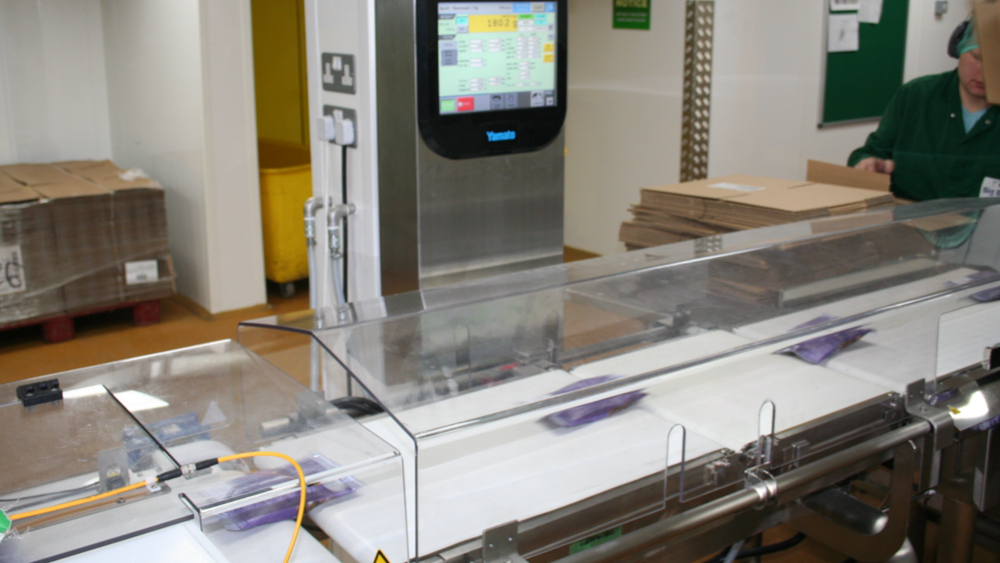What intelligent manufacturing is and how to introduce it into your plant
Manufacturers will always face challenges. In 2022, these challenges have included supply chain disruption, skills shortages, net-zero objectives and the ongoing ramifications of the coronavirus pandemic.
With the obstacles faced by manufacturers constantly evolving, the best protection a business can take is to promote resilience. This typically means driving productivity and quality, so you can consistently meet demand and exceed customer expectations.

Being resilient and delivering excellent results means adapting to ensure maximum performance, even in the face of difficulty. In the modern age, creating an optimised environment means utilising technology and data – and this is where intelligent manufacturing comes in.
Through intelligent manufacturing, businesses can access the insight they need to improve results across their operations, including reducing waste and costs without compromising output or quality. With the rise of industry 4.0, where data and automation have become an integral part of manufacturing, plants are under more pressure to introduce such processes.
In this guide, we explain in more detail what intelligent manufacturing is, how it can boost your performance and what it might look like for your plant.
- What is intelligent manufacturing?
- What are the benefits?
- How to implement intelligent manufacturing into your plant
What is intelligent manufacturing?
Intelligent manufacturing, sometimes referred to as ‘smart manufacturing’, refers to manufacturing that uses automation, data collection, artificial intelligence, machine learning or other types of technology integration to create optimal production conditions.
Technology and innovation are growing in all industries, so it’s no surprise that intelligent manufacturing is a popular topic. It is often synonymous with industry 4.0, a term used to describe the Fourth Industrial Revolution and marks the switch to increased interconnectivity and the use of digital in manufacturing.
While terms like ‘intelligent manufacturing’ and ‘industry 4.0’ have been conceptualised since the late 2000s and early 2010s, it is in more recent years that their principles have become common in plants. A study last year found that 80% of manufacturers see smart processes as key to their future success – and many have already started implementing them into their operations and accessing the results.
The growth in this trend thus far shows no signs of slowing, especially as innovation and technology continue to progress and consumer demand adapts. This means that it’s likely that more businesses will incorporate intelligent approaches to their production in the coming years – and those who don’t risk falling behind.
What are the benefits?
The main principle of intelligent manufacturing is to make the most of data across your operations. This brings many benefits and enhance performance.
By collecting and analysing data, you will be able to review the health of your production lines, including what is going well and what isn’t. From here, you can make the necessary adjustments to create the best possible environment for high-quality output.
Another benefit is that you are alerted to issues that need to be addressed. This might include errors with machinery, functions that aren’t being carried out properly or flaws in your end products.
Once you have identified these issues, you make appropriate adjustments – including repairing or recalibrating machinery. Over time, you may see patterns emerge which help you enhance entire processes and ensure efficiency. This will also enable you to prevent problems before they occur, reducing the risk of poor quality products, downtime or disruption.
Another part of intelligent manufacturing is allowing your production line to react to the data being offered through automation, connectivity and machine learning. This could include damage limitation when an issue is flagged or removing faulty products from processing.

The benefit here is that manual intervention is reduced, which decreases the labour requirement and saves time, cost and waste. This is particularly welcome when industry is facing skills gaps and supply shortages.
It’s important to remember that intelligence does not just need to apply to your physical production line. Data can come from many sources, including consumer research, competitor analysis and industry trends. These can assist in improving product concepts and forecasting demand to better customer expectations and drive your sales and profit accordingly.
Intelligent manufacturing also includes tracking the performance of each component of your production, including checking overall equipment efficiency (OEE). Through this, you review how effective each piece of equipment is and identify room for improvement. The aim is to have as high an OEE score as possible.
By improving efficiency, you are able to refine your operations to produce high-quality output in as little time as possible. With this optimised setup, you will lower costs and effort through reduced product giveaway, unplanned downtime and recall risk.
Ultimately, intelligent manufacturing helps you to fulfil your goals, whatever they may be – including reducing waste to meet sustainability objectives, improving cost-efficiency, growing productivity or simply unlocking results.
How to implement intelligent manufacturing into your plant
Although concepts like AI and machine learning commonly associated with smart manufacturing can seem nebulous, introducing innovative processes into your plant is not complicated. It may be as simple as beginning to collect data and analyse it across your operations.
Below, we’ve listed an easy step-by-step guide to help adapt your business.
Start collecting data
Data is a crucial element of intelligent manufacturing. So, to introduce it into your plant, the first step is to make sure you have the resources to start collecting insight.
In our increasingly digital world, more equipment comes with performance analysis as standard. By investing in machinery with this functionality, you gain data across equipment.
It is also worth acquiring data collection software for more comprehensive monitoring across your entire plant. Good software should visualise the data and enable you to access different views, including production line, shift or product type, through two-way communication with your equipment.
One such solution is Yamato Stats, designed to facilitate performance tracking across factories. It offers real-time data, enabling you to gather information and react as issues arise. It also allows easy auditing for your compliance requirements and tracks OEE and downtime to monitor efficiency.

Even more vitally, the software is simple to use with minimal training required, meaning you are able to empower staff to access data and incorporate it into their daily jobs.
Make adjustments
The benefit of collecting data is the ability to adjust your production for better results and an optimal environment.
Once you have implemented the resources you need to track data, regularly review performance. You need a set of key metrics to monitor to allow you to continually compare your results, establish patterns and review progress against your primary objectives.
By accessing the insight you need and actively using it, you will be able to make critical business decisions based on accurate data. This enables you to improve efficiency and quality, making the best possible output for your customers and stakeholders.
- Introduce automation
Another element of intelligent manufacturing is automation. With automated processes, you avoid or reduce the need for manual labour, which will save time and money. This will help you address any skills shortages and vacancies you may be experiencing.
Automation typically relies on connectivity with other processes in your production line. For example, you may have an automated system that sorts products that have failed in your inspection stages away from those that have passed. As opposed to having staff manually check items, hopefully catch faults and remove them from the line. By turning this into an intelligent process, your production will run more smoothly without the need for intervention and minimise the chances of flaws being missed.

As with data collection, automation does not need to be complex or large scale. Many offer either complete or semi-automation modes while still promoting reliability and accuracy. Automation solutions are able to be adapted to suit the unique needs of your materials, including fragile products that would typically require careful manual handling.
By incorporating automation at the appropriate points, you will create a more connected production line, where functions feed into one another and respond to issues as they arise. This will help fasten turnaround times, improve quality and reduce costs through a lower labour requirement.
Continual improvement
Once you begin to implement a smart approach in your plant, it is vital to continue to advance in this vein. It’s not a case of collecting data, making improvements and being set for life – you need to continually use the insight you have gained to review performance and re-optimise production.
While no manufacturer can ever ensure completely perfect conditions, seeking continual improvement will help you move towards this goal. It is natural for new issues to emerge throughout the production process or that needs change. Intelligent manufacturing will help you adapt accordingly.
In this sense, smart processes will support you when introducing new projects or expanding operations, with an understanding of the data and improved efficiency that allows you to meet your goals.
Stay up to date with trends and technology
New technology and ideas are constantly emerging. As industry 4.0 is the latest manufacturing era, what it looks like is still unfolding as more businesses seek to embody its principles and find new ways to operate.

When determining what smart manufacturing looks like for your plant, staying on top of the latest trends and tech is essential. This enables you to identify options that suit your needs and embed them into your plant.
By evolving as industry 4.0. does, you will be able to ensure your business is making the most of the intelligence gathered and reaping the rewards.
Conclusion
Intelligent manufacturing is the future of the industry. While many manufacturers may still be trying to understand what that means in their plant, it’s now essential to figure out the implications for your output and how to achieve it.
By doing so, you will begin to evolve and stay ahead of the curve. This will keep you ahead of your competitors and drive premium results across your KPIs while better serving customers.
If you want to introduce intelligence into your plant, Yamato can help.
Our equipment includes data collection and visualisation so that you can track performance from the start. We provide many automated solutions, including weighers and inspection systems, that work with a wide range of product types, enabling you to create fast and efficient processes.
Yamato Stats technology is the glue across your production lines and will adap to your chosen parameters, allowing you to gain detailed insight, gauge efficiency and improve control. For those wanting to incorporate intelligence on a smaller scale, we offer a lighter version that will track OEE and allow you to make adjustments.
To find out how we will assist your production line evolve with industry 4.0 and deliver outstanding results, get in touch with an expert team member today.

